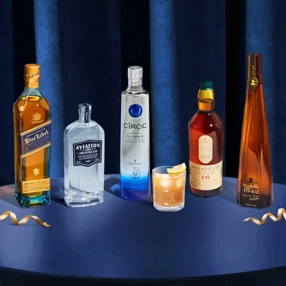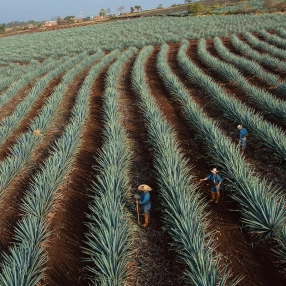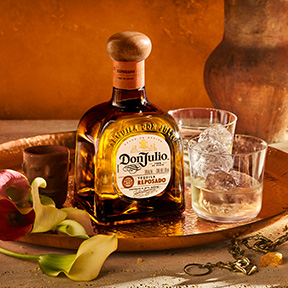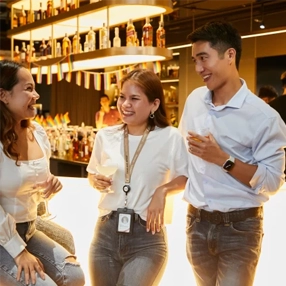We’re a global leader in premium drinks, the most exciting consumer products space.
From Hygge to Hogmanay: how the world celebrates the festive season
Tuesday 13 December 2016, London UK -- Global research released today by Diageo examines the shape of modern festive celebrations and shows the continuing importance of the centuries old tradition of raising a toast at this time of year. From trying to work your way up in the workplace, to hoping to get noticed by a romantic interest, the findings explore the reasons that people continue to perform toasting traditions across the world.
The global study of almost 7,000 adults shows the Danish concept of hygge, which erupted in popularity over the last year, continues to grow in different guises around the world. Hygge, often translated as cosiness, means creating a warm atmosphere at home and enjoying the good things in life with good people. Celebrating at home is more popular than going out with over half (57%) choosing to mark the moment by hosting others at home. In the hygge homeland of Demark, only 15% of people see going out to celebrate as important, the lowest of any country, whereas the majority (85%) of Indians still see being out somewhere special as key to any festive celebration.
From clinking glasses to toasting speeches, the research explores the cultural significance of celebration rituals. Nearly half (47%) agree that marking a moment through a specific act or phrase is a crucial part of their cultural heritage, while a superstitious fifth (20%) do so in order to ward off bad luck in their romantic endeavours. Men are the most likely to use a toast to attempt to impress their loved ones, with two-fifths (43%) seeing a toast as a way to catch the eye of a romantic interest, compared to just under a third (32%) of women. When considering how to make a good or bad impression, drinking to excess is the ultimate festive faux pas, with nearly two thirds (63%) seeing this as a way festive celebrations can be spoiled.
The most important factors to mark the moment and enjoy festive celebrations around the world:
1. Having the right company (89%)
2. Having the right food accompaniments (78%)
3. Hosting others at your home (57%)
4. Having the right alcoholic drinks (52%)
5. Special rituals (e.g. clinking glasses) (49%)
Carolyn Panzer, Alcohol in Society Director, Diageo said: “Toasting as a way to mark the moment during a celebration is nothing new, but our research shows just how far the tradition has come since its beginnings in the Neolithic period. Our research suggests two thirds of the world will be raising a toast of celebration this festive season and we know that where people celebrate, and who they do it with, is just as important as the drinks they choose to toast with. The global language of celebration is about people enjoying rituals and traditions that help mark the moment at this special time of year.”
The study also revealed:
- Men in the USA and UK are among the most superstitious, with 29% and 27% respectively believing that not completing a toast will lead to bad luck.
- Women in the USA are some of the least likely to use a toast to impress a loved one, with less than a fifth (19%) seeing it as a way to impress
- It’s not only the amorous who raise a toast: a quarter (25%) of animal loving people in the UK even raise a toast in honour of their beloved pet.
- A fifth (21%) of people across the world feel drinking more than the host is a festive no-no, whilst the same amount (20%) believed not knowing the right toasting traditions to be a faux pas.
- The majority of people in Spain, Germany, and Denmark (72%, 70% and 70%) view drinking to excess as the worst way to spoil a celebration.
Data on what people are searching for online also shows people are increasingly seeking out ways to raise the perfect toast. In the last four years, searches for topics such as ‘cheers’ and ‘the perfect toast’ across India, the US and the UK have increased by nearly two-thirds (60%).
Search data also shows people are ever more international in their toasting, searches for phrases like ‘cheers in…’ other languages have increased by 163%, with Italian (“Saluti!”) proving to be the most popular language for searches.
International toasting traditions to try this festive season:
- The origin of clinking glasses comes from a fear of being poisoned – bringing glasses together and spilling some liquid from one to another was used as an act of trust. If this isn’t a worry for you, you could try the traditional English etiquette of raising your glasses during a toast, rather than clinking them. You’ll be in good company with the Hungarians, who believe that glasses should never be clinked during a toast.
- The Danes and Swedes believe that it is important to maintain eye contact with the person they are clinking glasses with. To show you’re giving your full attention to your toasting partner this festive season, be sure to hold their gaze as you celebrate together.
- If you want to avoid alcohol, why not toast with your favourite soft drink? This is an accepted tradition in Japan and helps avoid the festive faux pas of drinking to excess. However, make sure you don’t use water when toasting with someone from Spain as they believe this brings bad luck.
- Why should this year’s festive occasions feature only one toast? In many cultures, from Vietnam to Georgia, multiple toasts are made throughout the evening. Take the opportunity to raise your glasses several times during the evening, and make personalised toasts to your guests, or even your pets!
With the hygge trend seeing more people wanting to celebrate at home Jennifer Le Nechet, World Class Bartender of the Year 2016, has created a simple guide to creating a fantastic festive celebration at home:
- Try using winter spices to add a sophisticated touch to cocktails at home: nutmeg, cinnamon and star anise are simple additions but work well and taste great.
- Get inventive in the kitchen, using a cookie cutter to make shapes from fruit peel, or burn a cinnamon stick as a way to add an extra sensory experience.
- Think about serving low ABV cocktails for your guests, more and more people are looking to celebrate responsibly and enjoy a few lower strength drinks.
- A great drink can make a celebration extra special, help people savour the moment by carrying out a toasting ritual and making eye contact with the people you’re celebrating with.
Teneo Blue Rubicon:
e. [email protected]
t. 020 7260 2700






